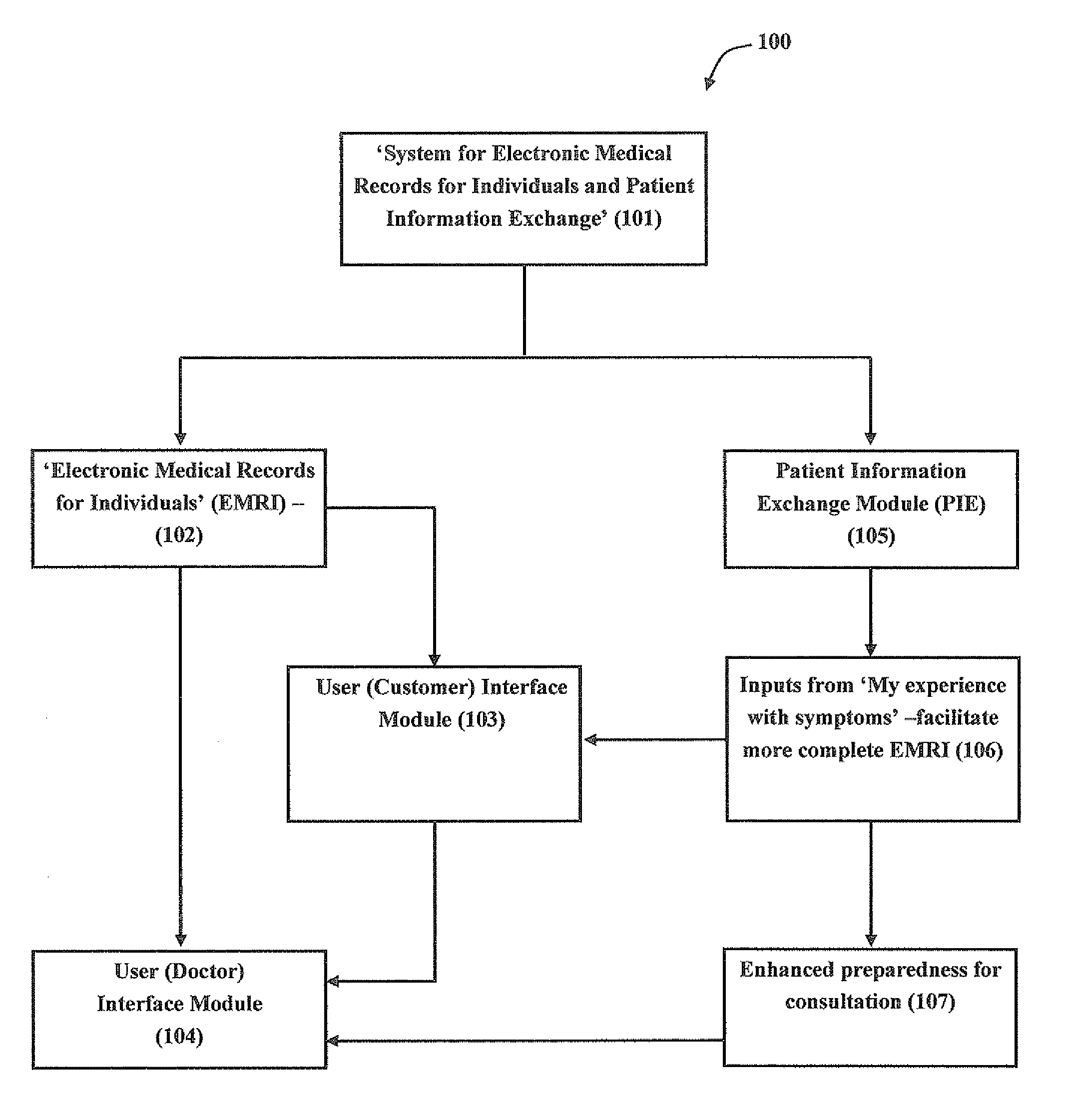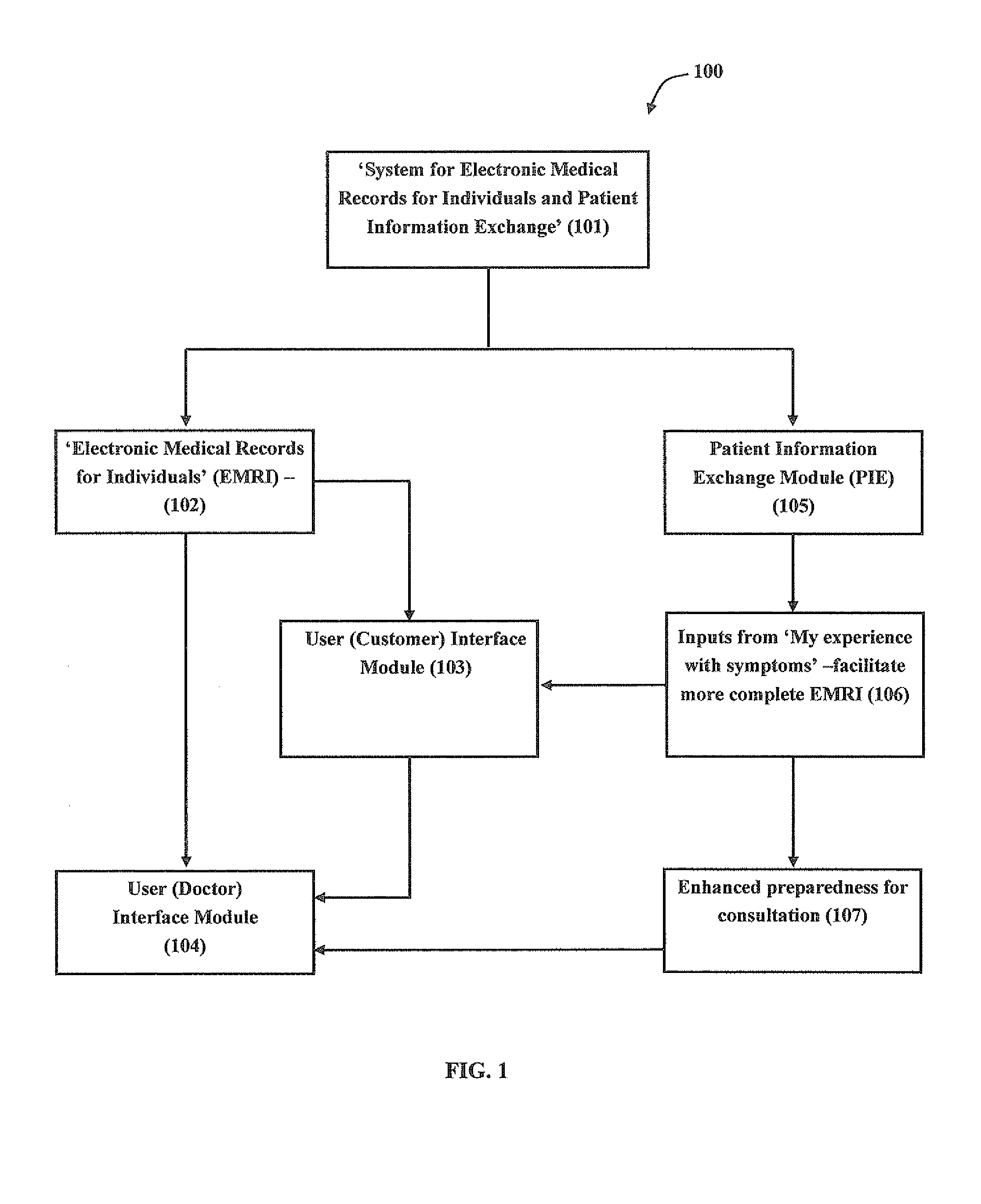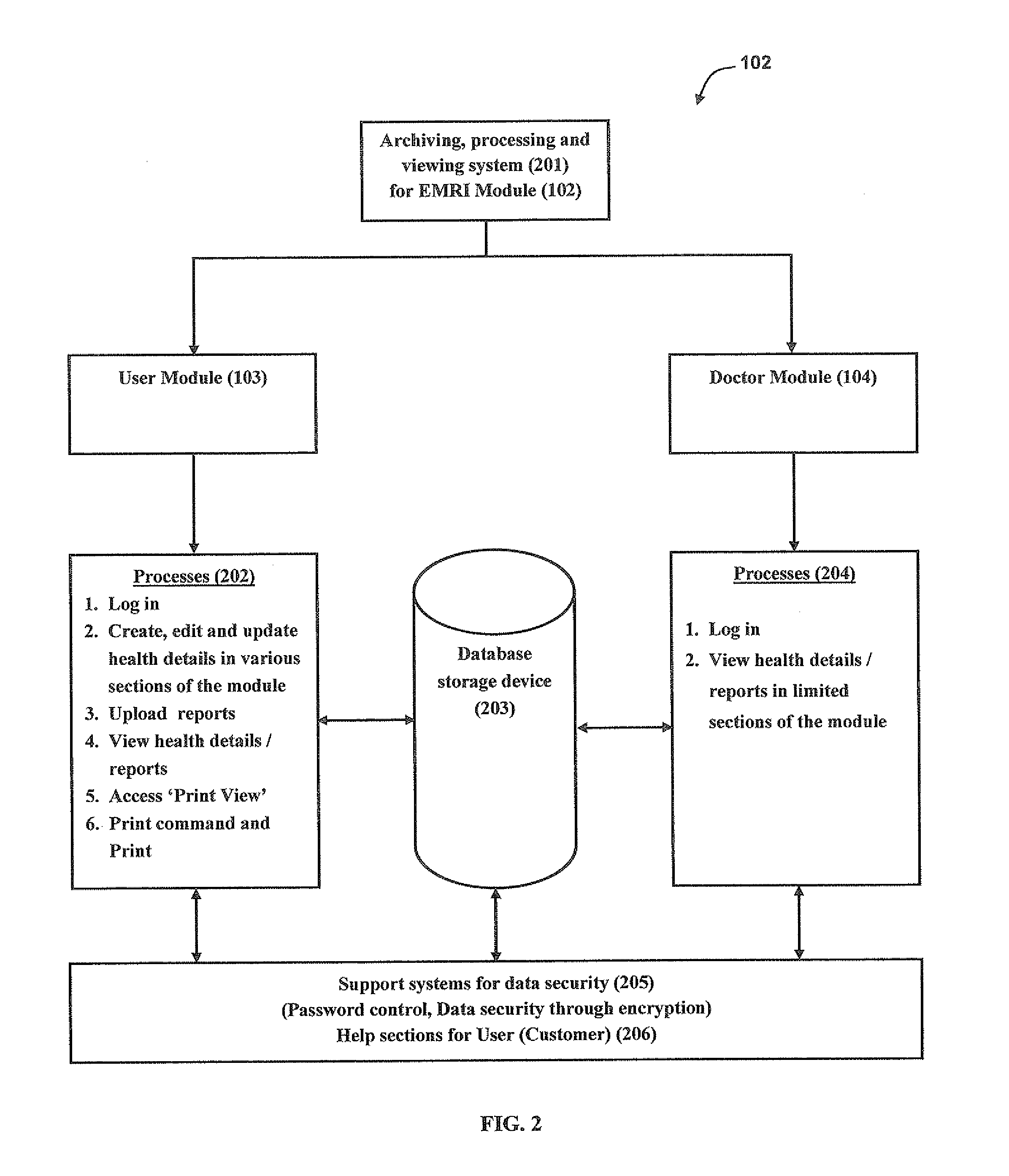In general, the patient informs about the
past medical history and symptoms to the doctor based on the remembrance and perhaps some disorganized medical records, which can lead to inadvertent miss in providing key information and further lead to inaccurate diagnosis.
Also, there are other communication gaps as a result of not being aware of past health details or not in a position to communicate or language barrier or accent variation, etc.
Conventionally, physical records of patient health information are maintained for diagnosis, where the chances of misplacing of medical documentations are high in these physical records, which lead to ineffective diagnosis in the absence of
past history of patient health information.
However, the information and details provided by the patients may not always be comprehensive, chronological and well linked to provide the doctors with sufficient inputs to carry out the diagnosis.
Also, it causes
confusion due to multiple records, and is difficult,
time consuming to peruse and understand the patient's case and the underlying issues or causes or background.
In some cases, patients are not able to precisely describe the
abnormality / the symptom(s) / its uniqueness or miss sharing some key symptom(s) unless the doctor seeks answer through searching questions.
Yet another challenge is to understand the patient's language and accent.
In some cases the patients are not able to communicate or not in a position to communicate or unclear in communication.
Also the key points of a verbal communication may be missed or lost as it may not be repeated by the patients unless asked for again.
Also sometimes patients may be embarrassed to share some sensitive and personal information through verbal communication, more so to a doctor of the opposite gender.
However, still it is not able to provide comprehensive, chronological and well linked medical information and records to achieve effective diagnosis.
Also such information and medical records may be in the archives of the hospital and may not be accessible from another hospital or another location.
The absence of comprehensive, chronological and well linked medical information and records can lead to many difficulties such as the need to ask more inquiring questions, taking additional time for inquiring or to review bulky reports, to assume or accept the patient's memory recall and verbal response, to diagnose with several incomplete information such as those related to the past
macro health issues, complete case history (from the origin) and trend, current symptoms / its uniqueness, test(s) undertaken, medicines being taken, allergies, habits and work hazards,
family health, etc.
Additionally, it is also difficult in quick
traceability of reports, to take that extra time to let the patient undergo repeat tests due to non-availability of previous test reports, etc.
These difficulties can further lead to ineffective diagnosis on the basis of available information, i.e. not providing 100% correct information to facilitate the diagnosis and medical intervention process.
Further, lack of comprehensive, chronological and well linked medical information and records can also cause many difficulties for the patients such as the need to recall from memory if information sought by the doctor(s) is not readily available; unable to present a cohesive story, present correct or complete information about the case or tests or medicines or its effectiveness; information about allergies of self or childhood health issues or allergies of blood relatives or
habit;
exposure to undesirable situations;
family health issues; taking extra time of self and the doctor for responding; make available pertinent information, reports in a short time as well as not be able to communicate clearly about the symptoms, the uniqueness about symptoms; the recent
environmental exposure that may be the cause of the symptom /
abnormality; change or details of habits; professional hazards; not in a position to communicate at all; inability to communicate due to language difficulty or accent or
anxiety or shyness, etc.
The other difficulties are to undergo repeat test(s) due to non-availability of previous test(s) reports, taking another appointment (post-test), expending resources arising out of this etc.
Further, absence of such a comprehensive, chronological and well linked ‘
Medical information /
record’ can also lead to other difficulties such as planning, implementing a structured preventive health plan or miss preventive health schedules, maintenance of records of preventive health, inability to track childhood immunization or childhood development that may lead to impairment of the ability of the child, incomplete
pregnancy related information and records (for women), miss to track health insurance payments / receipts, etc.
Also, lack of awareness about symptoms and / or their uniqueness can lead to ignorance of early stages of symptoms or ignoring the symptoms in their early stages that
delay in reaching a qualified medical professional well in time.
Further, there is lack of comprehensive records of symptoms to recognize the underlying
abnormality (
disease or illness), lack of ready reference of many valuable inputs documented from patients' experience in dealing with different types of symptoms {such as
medical procedure (treatment) undertaken, effectiveness of treatment, preventive / corrective steps that may be beneficial} in a structured formatting to derive meaningful information, lack of ready reference of valuable inputs related to prevention or mitigation of an abnormality or symptoms, lack of information related to abnormalities (
disease or disorder) with the patients' experience in dealing symptoms and the doctor diagnosis, and lack of information related to abnormalities in specific to the group / sub group / profile of the patients.
The patient has also learnt in a hard and painful way during the journey of this medical intervention and thus there is no platform to share the learning in dealing with symptoms for the benefit of the society at large.
In some cases, due to lack of awareness, patients are not able to precisely describe all the symptoms or miss to share some key symptoms or the uniqueness of symptoms unless inquired in depth by the doctor, which leads to the absence of comprehensive information needed for successful medical intervention for a given group / sub group / profile of a patient and non-availability of desired information / records to necessitate the need for additional tests with additional costs during the course of diagnosis that results in
delay in the start of medical intervention process.
Thus, it results in many drawbacks and difficulties in the process of diagnosis to determine the right course of medical intervention for the patients due to lack of awareness of patients about symptoms, incomplete information on symptoms, non-availability of pertinent medical records and lack of documented details of successful medical intervention with sub group / group / profile of the patient.
By timely sharing of such experience in a structured manner, every patient can deliver a great service to the society and people at large, as sometimes the damage done due to
delay in medical intervention can prove to be irreversible and very expensive or traumatic.
With reference to the conventional and existing approaches, it is very difficult to effectively diagnose and determine the right course of medical intervention for the patients due to incomplete and disorganized information about the patients.
 Login to View More
Login to View More  Login to View More
Login to View More 


